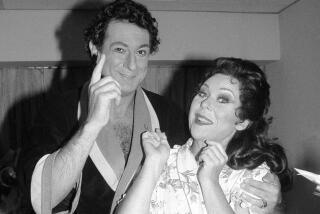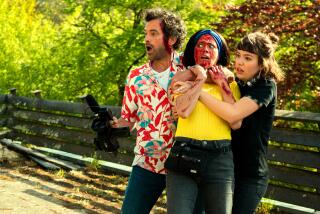THE UNKINDEST CUT
I must admit that my first reaction to Richard Natale’s Film Clip on Gerard Corbiau’s “Farinelli” was one of depression and disappointment (“2 Singers, 1 Computer Meld, No Short Cuts,” Feb. 5).
After several years of research and more than a year of writing my own screenplay “Castrato,” to see it beaten to the punch (as I am aware happens frequently in this town) was saddening.
However, as I read the article, the focus of which was entirely on the technological feat of replicating a castrato’s voice, I became frustrated, even livid. Corbiau, who supposedly did extensive research on his topic, has never heard the voice of a castrato?
Alessandro Moreschi (1858-1922) was the last known castrato and was recorded in 1902 and again in 1904. His recordings are available on Opal Records, on an LP and compact disc titled “The Last Castrato.”
My copy of the recordings was one of the most powerful pieces of my research. How one could presume to understand the reaction this phenomenon caused, much less attempt to replicate it, without actually hearing it is beyond me. It seems an extreme oversight on Corbiau’s part.
SCOTT RUSSELL
Burbank
*
The statement that “there are no castrati recordings” is untrue. Alessandro Moreschi, castrato soloist with the Choir of the Sistene Chapel, recorded about 17 sides in 1902 and 1904 at the Vatican. He was born in 1858--just in time for the cutoff date of 1870, when the procedure was outlawed--and died in 1922.
Ancient and eerie as “the last castrato” past his prime may sound, in his Opal recordings the centuries-old tradition is preserved for posterity.
Also, the title character, Farinelli, who was born in 1705 and died in 1782, obviously was an 18th-Century singer--not 17th-Century, as stated.
TOM McMANUS
Newport Beach
*
It is difficult to imagine the adulation once heaped on the likes of Farinelli and his fraternity from the evidence displayed on the CD “Alessandro Moreschi, the Last Castrato,” and it would be well to keep in mind that Moreschi was never a famous singer and was apparently well past his prime when recorded.
The religious context of the recording (all of the cuts on the disc but one are of excerpts from the Catholic liturgy) makes for an eerie and unsettling listening experience, given the nature of the performer.
RICKARD ROUDEBUSH
Sherman Oaks
More to Read
The biggest entertainment stories
Get our big stories about Hollywood, film, television, music, arts, culture and more right in your inbox as soon as they publish.
You may occasionally receive promotional content from the Los Angeles Times.










